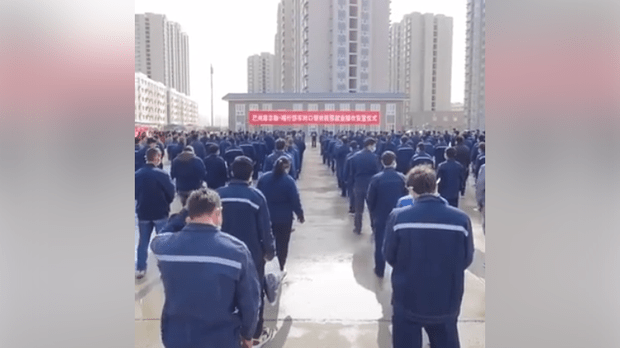The World Continues to Ignore the Genocide Against the Uyghurs
The Chinese Communist Party is committing genocide right now. There are currently at least one million Uyghurs held in over 85 concentration camps across the Uyghur homelands of Xinjiang (formerly East Turkestan). Since 2017, the Chinese Communist Party has oppressed the mostly Muslim Uyghur minority in an effort to cultivate domestic political support around Han Chinese ethnic nationalism. In concentration camps, Chinese officials have tortured and exploited the Uyghurs for slave labor, systematically gang raped Uyghur girls, forcibly aborted Uyghur babies and mass sterilized Uyghur women. A recent independent study, in consultation with over 50 experts, has found that the Chinese government’s actions violate every single article of the UN Convention on Genocide.
In the aftermath of the Holocaust, America and the free world pledged, “Never Again,” but have too often stood by while genocides took place. The Uyghurs are just the latest example. The world stood by while genocides claimed up to two million lives in Cambodia, up to one million lives in Rwanda, up to 500,000 in Darfur, and tens of thousands in Myanmar. America even aided and abetted genocides in countries like Indonesia, East Timor, and (arguably) Yemen.
When the humanitarian crisis began in Syria, President Obama drew “red lines” he then failed to defend. Key European allies backed away and Sen. McConnell rejected President Obama’s request for Congressional authorization to intervene. While the free world did nothing, Hezbollah, Russia, Turkey, ISIL, and the Assad regime waged a bloody war that displaced half the country’s population, 11 million people.
America and our allies are the only actors with the wealth and power in today’s world to prevent or mitigate genocide. We should do so, wherever and whenever we can.
1. What Would an Anti-Genocide Foreign Policy Look Like?
Each situation will require a unique approach, but there are some common tools we can consistently employ.
First, we should recognize that ‘engagement’ alone has failed. The theory that free trade—on its own—would democratize authoritarian regimes has been proven wrong. In fact, far from exporting democracy, we sometimes import authoritarianism. As one example, Xi Jinping enjoys broad domestic support because of continued Chinese economic success under his regime. That economic prosperity is a direct result, at least in part, of American engagement with China. Meanwhile, private American organizations and companies such as Nike and the NBA shy away from criticizing Chinese human rights abuses for fear of losing access to a lucrative market. (More on this below.) This is not to say that America should stop trading with China, but that we should recognize the limitations of engagement to effect democratic change.
Second, we should help create a bloc of democratic nations (think a new NATO-like alliance for democracy) to wield unified economic and diplomatic influence at the negotiating table. For the moment, America and the free world exert outsized influence on the world’s economies. While we still can, we should use our economic and soft power to reward democratic behavior and punish authoritarianism. The Trump administration arguably lost its recent trade war with China because America had no coordinated international strategy and went at it alone, without the support of any other democratic nation.
Third, America and its allies (perhaps through the vehicle of a new ‘International Democracy Summit’) could also sanction and blackball the enablers and agents of genocide. In this regard, too, international cooperation is critical: our sanctions carry far greater weight when imposed jointly with allied nations, achieving stated diplomatic aims far more often and sometimes ameliorating large, seemingly intractable problems. For instance, broad, multinational pressure on Libya helped push the government of Muammar el-Qaddafi to admit responsibility for the 1988 Lockerbie bombings and renounce their WMD program.
Finally, in limited engagement scenarios, like the genocide in Rwanda, where we:
- Enjoy a clear military advantage
- Are supported by an international coalition of democratic allies
- Have a clear exit strategy, and
- The cost to American blood and treasure is relatively low,
we should intervene militarily to stop genocides in progress. But military force is a last resort that should only be used sparingly.
2. How could we intervene in support of the Uyghurs?
First, we can send a strong message against the use of slave labor by passing legislation against it. The House has already passed a Uyghur Forced Labor Disclosure Act, introduced by Congresswoman Jennifer Wexton (VA-10), which would require public U.S. companies to audit their supply chains for Uyghur slave labor. Multinational corporations have lobbied against the bill, arguing it would be difficult to fully investigate and eliminate such ties. While this is a legitimate concern, there are ways to address it and still ensure that the bill has teeth.
Second, should penalize American companies who partner with the authorities behind the Uyghur genocide, perhaps by implementing a new ‘aiding and abetting tax.’ In 2018, McKinsey and Co., which has consulted for authoritarian regimes around the world, held their annual corporate retreat just four miles away from a Uyghur concentration camp. Disney filmed parts of its 2020 film ‘Mulan’ near Uyghur concentration camps and specifically thanked multiple Chinese Communist Party authorities for helping in their production. Even the NBA quickly silenced a prominent general manager when he made the mistake of supporting democracy in Hong Kong, potentially hurting NBA profits in China.
Third, we can work to resurrect some form of the Trans-Pacific Partnership (TPP) agreement with more democratically-inclined nations in the Pacific to develop an economic bloc, thereby supporting democratic economies and closing off avenues through which China could gain further influence in the region. This could resemble a Kennan-esque approach to containment, limiting China’s reach and giving countries in the region another place to which they could turn for economic aid instead of the People’s Republic.
Fourth, in addition to legislation and coordination with our allies in the region, we can sanction Chinese companies responsible for hacks and data breaches. The U.S. has already taken positive steps in this direction including the Trump administration’s fight against Huawei and Senate Democrats’ proposed legislation to fund major U.S. research and counter growing Chinese state capabilities. In 2018, President Trump signed the bipartisan BUILD Act into law, creating an American alternative to China’s Belt and Road Initiative for developing economies. And just this past week, President Biden sent Secretary of State Antony Blinken and Secretary of Defense Lloyd Austin III to South Korea and Japan on a four-day trip to strengthen our economic and defensive alliances in the region.
The CCP is committing genocide. If we can use our economic power alongside our alliances abroad to punish the Chinese state for its crimes against humanity, then we should. Every year at Holocaust remembrances, American leaders vow, “never again.” Now let’s act on that promise.
And if you missed our event on Tuesday night with Bellingcat founder Eliot Higgins, moderated by Yascha Mounk, you can find the full video here.





